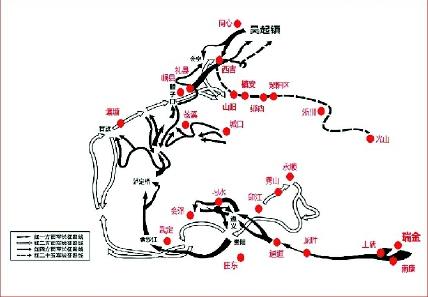 “No one should be left behind in the building of a moderately prosperous society and, in particular, former revolutionary base areas should not be neglected,” General Secretary Xi Jinping said in 2016 while inspecting Dawan Village, Huashi Township, Jinzhai County, Anhui Province, expressing his concern for the people in former revolutionary areas.
“No one should be left behind in the building of a moderately prosperous society and, in particular, former revolutionary base areas should not be neglected,” General Secretary Xi Jinping said in 2016 while inspecting Dawan Village, Huashi Township, Jinzhai County, Anhui Province, expressing his concern for the people in former revolutionary areas.
 Road Map of the Long March Belt Educational Project Targeted at Alleviating Poverty
Road Map of the Long March Belt Educational Project Targeted at Alleviating Poverty

Education is prioritised as part of poverty reduction as the fight against ignorance comes before that against poverty. In order to thoroughly implement the decision and deployment of the Party Central Committee, the State Council, and the Party Group of the Ministry of Education (MOE) on the implementation of the educational project targeted at alleviating poverty, in April 2017 the OUC launched the Long March Belt Educational Project Targeted at Alleviating Poverty. It planned to raise RMB 120 million and to spend four years conducting degree and non-degree education programmes and educational projects targeted at poverty alleviation in infrastructure in 25 key counties dedicated to national poverty alleviation in 12 provinces, autonomous regions, and municipalities along the route of the Long March taken by the Red Army, including Jiangxi, Sichuan, and Hunan. In order to train high quality local professionals with technological skills and management expertise who can remain in rural areas, trainings are given to various kinds of rural professionals, and rural cadres and impoverished households filing for poverty alleviation are offered financial support to study in open education.
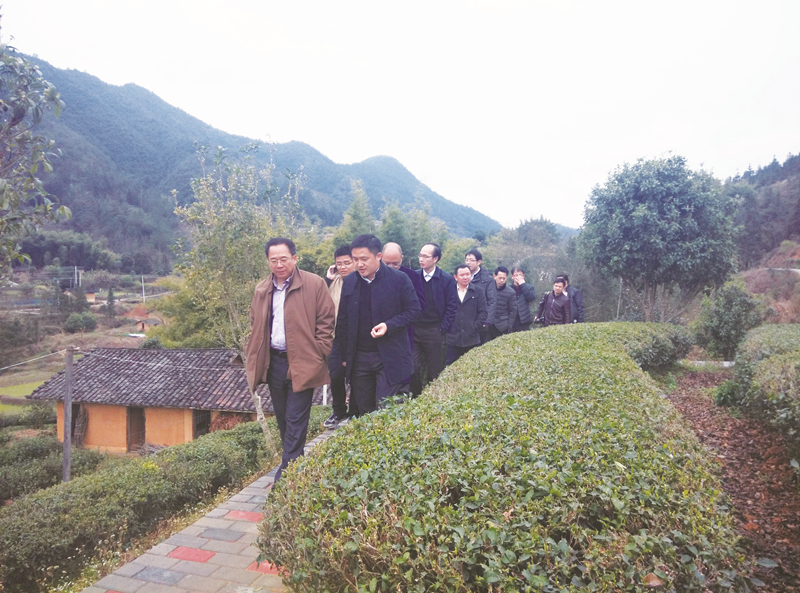 Yang Zhijian, secretary of the CPC OUC Committee and president of the OUC, conducting an investigation in a key county for national poverty alleviation
Yang Zhijian, secretary of the CPC OUC Committee and president of the OUC, conducting an investigation in a key county for national poverty alleviation
The improvement of the public’s happiness index is where the value of the OUC lies
In his speech at the National Education Conference, General Secretary Xi Jinping underlined the importance of “adhering to running education rooted in the vast land of China”. The fundamental meaning of this is to advance educational work by focusing on China’s national conditions, culture, and actual needs. Poverty alleviation through education is an expression of the OUC’s orientation to “social demand” aimed at "social responsibility" in “an open and flexible" way. As Yang Zhijian, secretary of the CPC OUC Committee and president of the OUC said, “The educational philosophy of the OUC is oriented to the broad level, rural areas, border areas, and areas with large ethnic minority populations. Furthermore, the improvement of the public’s happiness index is where the value of the OUC lies. To this end, we focus on poverty-stricken groups in the hope of improving the life of impoverished populations and having them comply with the constant changing future through our efforts. We don’t aim to make our students into science or technology leaders, business elites, or politicians. What we do is improve their overall quality and skills to make a living, and enable them to solve realistic difficulties in their life and work. If we succeed in this then we will have fulfilled our social responsibility to promote equal access to education.”
The predecessor of the OUC was China Central Radio and TV University, which was founded with the advocacy and approval of Comrade Deng Xiaoping. On 31 July 2012, the Open University of China was officially inaugurated in the Great Hall of the People in Beijing. As a new type of university supported by modern information technology, its responsibility is to promote equal access to education. Its school network covers both urban and rural areas in China, it practises the educational philosophy of “making learning available for everyone anytime anywhere”, and it facilitates the sharing of quality resources by all members of society. The university aims to promote lifelong learning for all, offer education to anybody with the desire and ability to learn, and to meet learners’ diversified learning demands.
At present, the OUC has nearly four million active students all over the country. More than 70 percent of these students come from grassroots communities and 55 percent are in border areas and areas with large ethnic minority populations in China’s central and western regions. There are 200,000 rural students, 120,000 non-commissioned officer students, 270,000 students from minority ethnic groups, and 6,000 disabled students.
Over the past 40 years, the OUC has been advancing poverty alleviation through many of its special projects. The university launched the One College Student per Village Programme sponsored by the MOE as early as 2004, which in recent years has become the Rural College Student Cultivation Project. People from rural areas with the ability to learn can enter the OUC by way of free registration. To date, the One College Student per Village Programme has enrolled a total of 610,000 rural students, of which 400,000 have graduated. It has trained a large number of leaders in obtaining wealth through science and technology, in disseminating advanced culture, and in practicing lifelong learning.
The OUC has constantly stepped up its efforts in Qinglong and Weixian counties in Hubei Province. The university sent a deputy section chief to serve for a period as vice governor in charge of work on science and technology and assist with poverty alleviation and education work in Qinglong. In 2018, RMB 3.06 million was designated for poverty alleviation work in Qinglong and Weixian. A special scholarship has been set up, assistance has been given for the construction of a computer room and an OUC book house, and technological trainings on the cultivation greenhouse vegetables, fruit trees like pears and grapes, traditional Chinese medicinal herbs, and edible fungi have been given, benefitting around 2,000 people.
Furthermore, during the 11th, 12th, and 13th Five-Year-Plan periods, the university has provided educational assistance to border areas and areas with large ethnic minority populations. For example, the construction of the OUC Tibet School through collaboration has created more opportunities for local farmers and herdsmen to receive higher education. In Xinjiang, special assistance has been given for bilingual teaching, online platforms, and resource development, and training professionals for minority ethnic groups. In addition, about 300 cloud classrooms have been built in Xinjiang, Tibet, Qinghai, Gansu, and other western regions. It is becoming a reality for learners to have the same one class in different areas, which has effectively mitigated the tension of teacher shortage in remote areas. The OUC is also cooperating with Hunan Radio and TV University (RTVU). It has given O Learning Pad learning terminals to 18,600 rural students, developed the West Yunnan Learning Network (dianxi.nerc-edu.com), and built OUC Book Houses in remote areas with large ethnic minority populations.
Leverage the strength of the OUC system to put in place the Long March Belt Educational Project Targeted at Alleviating Poverty
Since the official inauguration of the Long March Belt Educational Project Targeted at Alleviating Poverty in April 2017, in an effort to block the intergenerational transmission of poverty the OUC has advanced the project in 25 national poverty-stricken counties along the Long March Belt covered by the Red Army soldiers. Over the past two years, the OUC has mobilised the whole of its system to promote the implementation of this ambitious and significant project. It has overcome all kinds of difficulties to put in place the targeted poverty alleviation, and phased achievements have been made, which have been recognised by the Party Group of the Ministry of Education and people from all walks of life. To date, RMB 20 million has been invested, benefiting over 25,000 impoverished population and village students and improving the educational conditions and capacities in the study centres.
Six major measures have been taken as part of the Long March Belt Educational Project Targeted at Alleviating Poverty. The first is to offer free train rural grassroots cadres. Township cadres and leading members of village Party branch committees and villagers’ committees in poverty-stricken counties are offered free registration to junior college and undergraduate programmes of continuing education with the aim of strengthening government construction at the rural grassroots and training leaders in alleviating poverty. The second is to offer free junior college and undergraduate degree continuing education opportunities to people filing for poverty alleviation who aspire to go to university but are unable to do so because of family issues. The third is to train the skilled professionals urgently needed by industries and enterprises. Courses are offered in cooperation with relevant industries and enterprises, and students in poverty-stricken counties are admitted free of charge to allow them “to work while learning” and to make the concept of “admission to learn means finding jobs and university entrance means employment” a reality. The fourth is to offer migrant workers various kinds of free vocational and skills training, including migrant workers in cities and the surplus rural labour force that surrounds local characteristic pillar industries. The fifth is to establish scholarships and grants to encourage and assist students to complete their learning. The sixth is to offer financial support for the construction of information technology infrastructure, launch various kinds of free quality learning resources, offer financial assistance for the construction of bases for educational projects targeted at alleviating poverty, and serve local economic and social development.
In Sichuan, for example, with the support and instruction of the OUC headquarters, the OUC Sichuan Branch worked together with the radio and TV universities in Aba and Guangyuan to put in place and promote the smooth implementation of the Long March Belt poverty alleviation project. It has brought into play its advantages and characteristics in terms of open education, system operation, and resource sharing in order to deepen teaching reform, implement the blended teaching model of “internet + face-to-face tutorship + practice”, conduct online and offline teaching activities, and provide teaching support services. At the same time, courses with local characteristics customised for Cangxi and Rangtang are also offered in order to meet actual needs such as rural revitalisation and poverty alleviation. As of the end of October 2018, the OUC has appropriated a total of nearly RMB 2 million of special funds for Cangxi and Rangtang and a total of 470 people have been admitted to degree upgrading projects for grassroots cadres and impoverished households filing for poverty alleviation.
 Cultural inheritance training in Huanma paper cutting in Cangxi County
Cultural inheritance training in Huanma paper cutting in Cangxi County
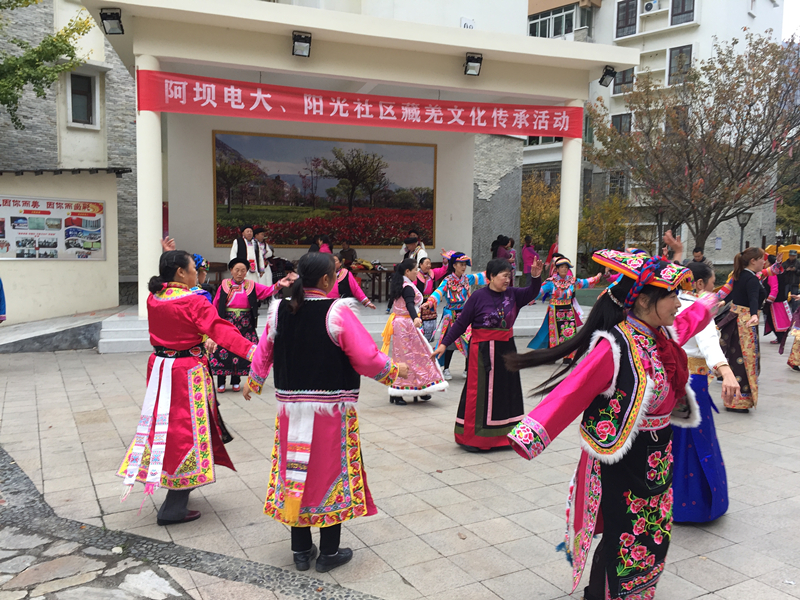
Qiang and Tibetan cultural inheritance activities in Aba Prefecture
Train rural local cadres to lead minority ethnic groups to secure a decisive victory for poverty alleviation
Rangtang is an area at the extreme west end of the route covered by the Red Army during their Long March. Today, Tibetan people account for 90 percent of the 42,000-strong population. It is a key national poverty-stricken county due to its remote location, under-developed economy, and daunting task of poverty alleviation.
“It is impossible to keep professionals in remote areas if employers cannot boost their academic qualifications; without this, they cannot obtain higher level professional titles or salary increases, and grassroots cadres will have no sense of achievement in their own job positions. To this end, it is necessary to improve the education level of grassroots cadres,” Yu Fu, vice director of the Education Bureau of Rangtang County, said. In the 2017 autumn term, 65 students from Rangtang participated in the Long March Belt project to improve the educational qualifications of grassroots cadres. So far, they have completed the study and examinations for about 10 courses and their pass rate in the final term examinations for the last two semesters has reached 93.8 percent. After more than one year of learning, the grassroots cadres have greatly improved their ability to serve, acquire wealth, and govern. They have become a surprising force in securing a decisive victory for targeted poverty alleviation. Moreover, the Rangtang County CPC Committee has proposed implementing the “Education Improvement for One Hundred Local Cadres” project in an effort to train 100 local cadres within five years with a focus on cultivating a batch of professionals who are willing to stay behind and work for their rural hometowns.
Zhou Bei, a Tibetan woman serving as a special cadre for poverty alleviation in Nanmuda Township, Rangtang Country, is now studying in the OUC’s undergraduate Chinese Language and Literature programme. She previously majored in broadcasting in Chengdu but returned to Rangtang after graduating because of her love for her hometown. While working alongside other ordinary people, she discovered her shortcomings and signed up for further study in the Long March Belt project in order to better serve local people. After participating in learning, she says that she is able to create her own study plan, better arrange her own tasks and time, and better serve local people.
Luo Gang, a young man from the Qiang ethnic group serving as a special cadre for poverty alleviation in Zongke Township, Rangtang County, is now studying in the OUC’s undergraduate law science programme. His previous major was accounting but he later found that his knowledge could not solve the villagers’ legal problems. He signed up to study when he learned of the Long March Belt Educational Improvement Project for Grassroots Cadres from the county’s education bureau. Luo Gang’s favourite course is Commercial Law. Although it is difficult, it helps to solve real problems and settle debt disputes between villagers. Conflicts once triggered by money that affect rural harmony can now be resolved with his legal assistance. Using legal channels to solve problems not only guarantees the villagers’ legitimate rights but also maintain social stability.
President Xu Shuolin from Aba Radio and TV University (RTVU) indicated that Aba RTVU’s Rangtang Work Station has stimulated the progress of Rangtang’s local economic and social development and poverty alleviation project by taking the initiative to become integrated with county development, positively exploring the cultivation of a new type of grassroots cadres, and giving effective assistance to targeted poverty alleviation and social work.
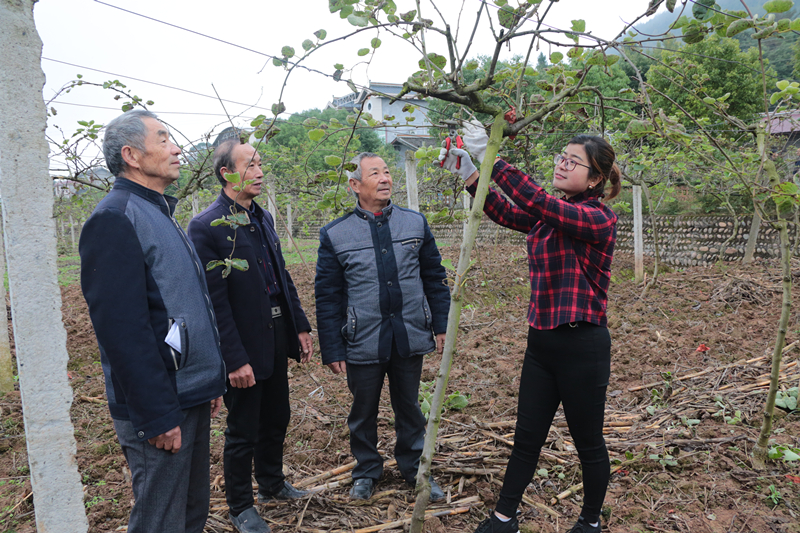 Villagers learning kiwi tree pruning technology in the field classroom
Villagers learning kiwi tree pruning technology in the field classroom
Innovate teaching according to local conditions so villagers can learn real skills in practical classes
Cangxi, where the Fourth Front Army of the Chinese Workers’ and Peasants’ Red Army started their Long March, is also a key county for national poverty alleviation. As a leading producer of red kiwifruit and snow pears, it is blessed with distinctive industrial and teaching advantages. The OUC has intensified educational poverty reduction by implementing the Long March Belt poverty alleviation project in Cangxi.
In Cangxi RTVU's Teaching and Practice Centre for E-Commerce, the classroom, which can accommodate over 100 people, was packed with students taking notes. The practice base is not only for lectures; it is also where students get training in five development models: e-commerce + sale of goods, e-commerce + talent cultivation, e-commerce + small scale farming, e-commerce + agricultural enterprises, and e-commerce + cooperatives. The teacher gave the students training in basic e-commerce operation, helped them to master the general e-commerce sales process , and set up a platform to link consumers and producers, offering a good solution to agricultural problems in poverty-stricken mountainous areas and opening a path toward prosperity in rural areas.
In Jiangjun Village in Cangxi’s Yuanba Township, Yan Shugui, who had just finished a lecture on the theory of the control and prevention of kiwifruit diseases, took students from the Long March Belt Educational Project Targeted at Alleviating Poverty programme to the teaching and practice base for kiwifruit cultivation and gave a demonstration of how to judge pests and diseases. “With technology, it is a money tree, and without technology, it is just a locust tree,” Secretary Luo Quanming from Cangxi County’s Guihua Village Party Branch Committee said jokingly after listening to the teacher. During the class, he learned that it was not true that the more branches on a tree the better and that it was not necessary to cut down all the unspecified trees around the kiwifruit trees because they offered protection from the wind. “Many of our past improper practices have been corrected. After returning to the village, we will pass on these technologies to the four households who grow kiwifruit in our village.”
According to He Ning, head of the Organisation Department of the CPC Cangxi County Committee, a number of students with the capacity to acquire wealth and the power to set an example have emerged from the project. These students understand farmers and rural areas. The next stage is to have them give lectures at the RTVU so as to lead more people to become rich.
Driven by the OUC’s Long March Belt poverty alleviation project, Cangxi RTVU has been integrated with the Rural Local Cadres Training Project (One Thousand People Plan) of the Organisation Department of the CPC County Committee. Its goal is to encourage rural grassroots cadres to enter open education jointly funded by the OUC headquarters and the Organisation Department of the CPC Cangxi County Committee, and to lay a solid foundation for local rural revitalisation and human resource reserves. President of Cangxi RTVU Che Mengliang said that a total of 227 students had been admitted to study in the Long March Belt project in the 2017 autumn term, including 198 students in the junior college programme and 29 students in the undergraduate programme. 2018 enrolment covers 175 students, including 143 in the junior college programme and 32 in the undergraduate programme. Twenty-nine students from poverty-stricken families filing for poverty alleviation have also been admitted free of charge.
The poverty alleviation project through education will be conducted on a broader scale and at a higher level
Yang Zhijian has said that the OUC will carry out targeted poverty alleviation on a larger scale and at a higher level. The Long March Belt Educational Project Targeted at Alleviating Poverty will enter a period of steady implementation and the OUC will not stop until poverty is eradicated in all counties in 2020. Financial assistance for degree education students will run on to 2022. The OUC will continue to advance the implementation of all the tasks related to poverty alleviation through education deployed by the Ministry of Education. We will continue to implement the relevant poverty alleviation projects in the three regions (Tibet Autonomous Region, the Tibetan Region of Sichuan, and the four prefectures of Kashi, Hotan, Aksu, and Kezilesu in South Xinjiang Ugur Autonomous Region) and three prefectures (Liangshan Yi Autonomous Prefecture in Sichuan, Lujiang Lisu Autonomous Prefecture in Yunnan, and Linxia Hui Autonomous Prefecture in Gansu) affected by extreme poverty. According to the requirements of the Agreement to Assist Tibet and Xinjiang in the 13th Five-Year-Plan Period and the overall arrangement of the educational project of the Ministry of Education targeted at alleviating poverty in the three regions and three prefectures affected by extreme poverty, the OUC will coordinate all of its relevant inner departments for the further implementation and approval of the agreement. It will put in place poverty alleviation assistance for Qinghai through education, sign and complete the relevant agreement, and implement poverty-alleviation measures laid out upon in the agreement.
Deputy secretary Liu Chen from the OUC CPC Committee indicated that only preliminary achievements had been made in the Long March Belt Educational Project Targeted at Alleviating Poverty. The OUC will honour its commitments in line with the requirements of the Party Central Committee. It will not only have a profound understanding of the arduous nature of the educational endeavour targeted at alleviating poverty but will also strengthen its determination and confidence. It will continue to summarise useful experiences and continue to improve the relevance and accuracy of poverty reduction measures. It will further enhance planning and coordination to mobilise the enthusiasm of all parties, uniting the poverty reduction efforts of the OUC and all of its branches towards coordinated development that demonstrates their own advantages and characteristics.
All of the OUC’s targeted poverty alleviation efforts, especially the Long March Belt targeted poverty alleviation project, embody the OUC’s educational concept, characteristic advantages, and support for old revolutionary base areas. In the future, we will secure a decisive victory in poverty alleviation in a more pragmatic way and with more forceful and targeted measures under the leadership of the Party Group of the MOE. We will try to lead poverty alleviation by helping people increase confidence in their own ability to lift themselves out of poverty, to block the inter-generation transmission of poverty, to strengthen people through education, to enrich people through skills, to give peace to people through employment, and to promote the fundamental eradication of revolutionary base areas and to allow them to enter the moderately prosperous society together with the rest of the country.
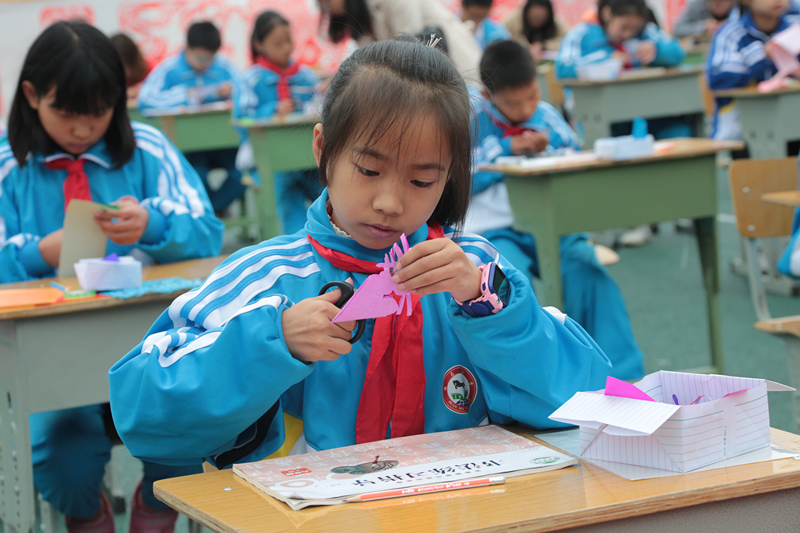
The OUC can and will play a greater role in securing a decisive victory in fighting against poverty and in becoming a moderately prosperous society together.
Written by He Jing, Su Junqi , photographed by Yu Zhangli, CPPCC News